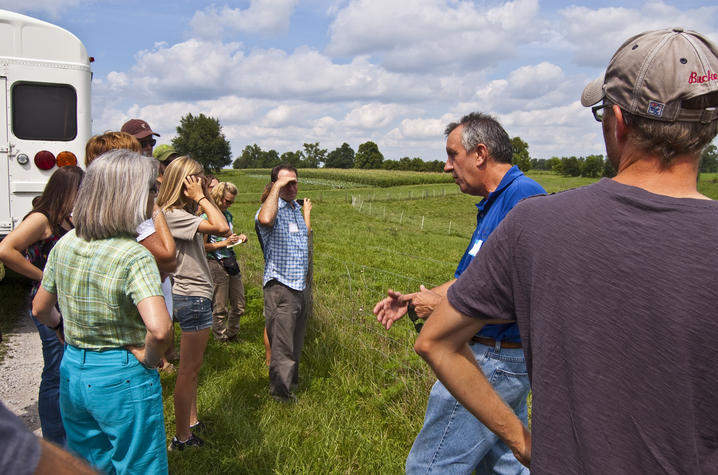Sustainable Agriculture Education Is Growing

LEXINGTON, Ky. (Aug. 16, 2011) – Approximately 200 educators and students from as far away as Hawaii and Norway gathered in Lexington recently to exchange ideas and methods on sustainable agriculture academic programs in universities and colleges. The University of Kentucky College of Agriculture and the Virginia Tech College of Agriculture and Life Sciences co-hosted the fourth Sustainable Agriculture Education Association Conference.
“There's a change that's been happening for a long time now, and more and more colleges and universities are starting to have programs like this (in sustainable agriculture),” said Mark Williams, director of UK’s sustainable agriculture degree program and one of the conference organizers. “It's sort of like working in a vacuum, because this field is relatively new, so instead of people just trying to develop their own system, it (the conference) is partially focused on connecting these programs together and getting these synergistic aspects to the community you build around this.”
“The Sustainable Agriculture Education Association is the only national level forum for issues of teaching and learning in sustainable agriculture,” said Krista Jacobsen, UK assistant professor in horticulture and also one of the event’s organizers. “There was a real need to join forces and exchange ideas and be efficient and smart about the development of these things and move this forward fast, so it (sustainable agriculture) could gain legitimacy at their institutions.”
UK and Virginia Tech are two of 12 land-grant universities in the country who have degree programs in sustainable agriculture. UK’s program, begun by Williams with the support of UK Associate Provost Michael Mullen, then associate dean of academics, and College of Agriculture’s Dean Scott Smith, is about five years old and offers a Bachelor of Science degree in sustainable agriculture. Virginia Tech offers a cross-disciplinary minor that includes four courses and boasts students from every college at the university. They also partner with Heifer International to offer their students additional experience in building community consensus and capacity. Representatives from eight other land-grant universities, including The Pennsylvania State University, North Carolina State University, University of California at Davis, University of Missouri and Clemson University among others, attended the conference.
“I think it's safe to say that in the land-grant arena for programs that have majors or minors in sustainable ag or one of its variants, agroecology or organic farming, we're certainly in the lead group,” Williams said, referring to UK’s program, which has grown by leaps and bounds since its inception. The College of Agriculture offers its students an apprenticeship program on the organic farm at the Horticultural Research Farm in Lexington, as well as a cross-disciplinary approach to academics.
Williams said the conference made him see UK’s program with fresh eyes.
“It really made me realize the group of players that we have here, the team that we have here, from our departmental chair Robert Houtz to Scott Smith to Mike Mullen to the president (of UK),” he said. “Then you throw in these farms that we have, like our (organic) farm we have in the city with incredible soil and passionate students. We have a lot of components that allow us to do what we do that I take for granted. And when you get a lot of feedback, you realize that not every place has all this. And it goes all the way up to Mac Stone (Kentucky Department of Agriculture executive director for marketing) and the Kentucky Department of Agriculture and the (organic) certification program and the efforts that they have and the support that they give us. They see the importance of what we're doing. I think that’s one of the reasons we're progressing at the rate we're progressing, because we have such support.”
Jacobsen said that the Sustainable Agriculture Education Association serves many different types of schools that have very different programs.
“Our program (at UK) has been built to meet the needs of our students and as a fit for our farm and the farmers that we're trying to serve by providing a model system. Whereas other programs are developing theirs to meet their own standards,” she said.
“Some of the people were similar to us—big farms with apprenticeship programs,” Williams said. “Other people had apprenticeship programs, but it is with volunteers on a really small garden, one-fourth acre, one-half acre, something like that. The way the teaching is done, what programs are run, there's a huge variation on the way things are done—from whole curricula like us to one class. So people come here for different reasons.”
Susan Clark, director of Virginia Tech’s Civic Agriculture and Food Systems minor in the College of Agriculture and Life Sciences, said, “This kind of conference is really uplifting, not just to me but also to the students. I think it’s unique in associations to not be afraid to let the students have a voice and have that open space for discourse. I think it's pretty special.”
Clark, an associate professor in Human Nutrition, Health and Exercise at Virginia Tech as well as an alumna of UK’s School of Allied Health, was one of the organizers of the conference along with Kim Niewolny, Virginia Tech assistant professor in Agriculture and Extension Education. Virginia Tech’s College of Agriculture and Life Sciences supported 20 scholarships, which allowed students, extension faculty and community partners to attend the conference.
“To have the support of people who believe in sustainable agriculture education and value it really gives me hope,” she said.
Williams agreed. “To have the opportunity to do what we do, I definitely will not take that for granted anymore after this experience. I think it's unique. It's changing in a lot of places.”
MEDIA CONTACT: Carol Spence, (859) 257-8324; Carl Nathe, (859) 257-3200.




